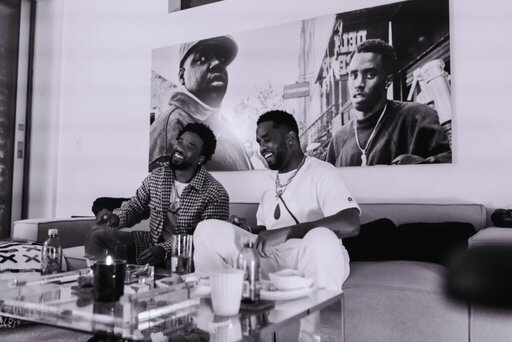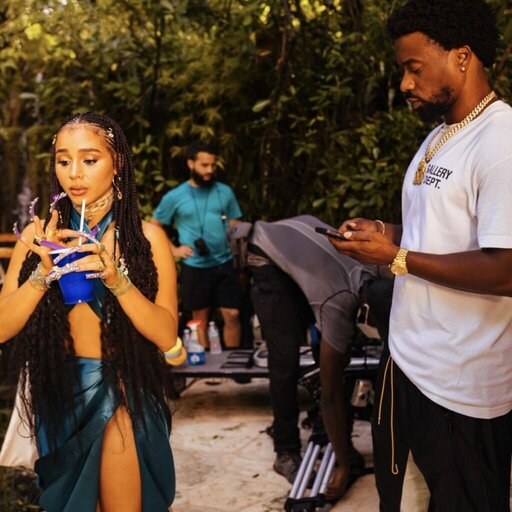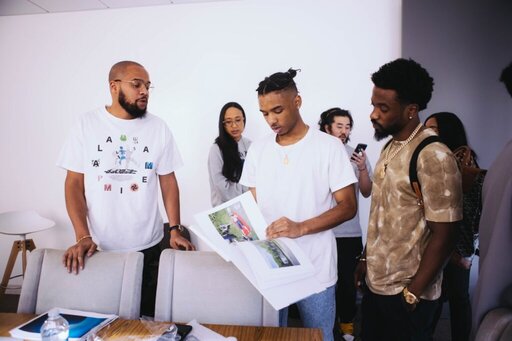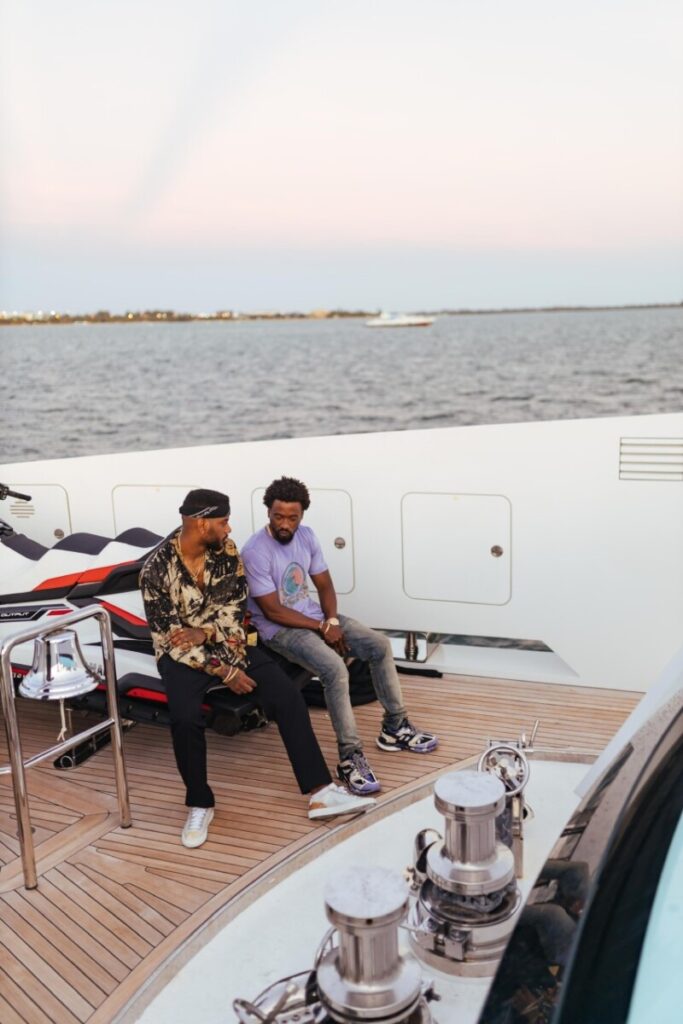Dominique discusses partnering with Pardison Fontaine and Bryson Tiller, creating his own label, and the myths of being a manager.
When you hear Bryson Tiller’s name, you might think of hit songs “Don’t” and “Exchange” from his 2015 debut studio album. Or maybe your mind floats to the chart-topping “Gotta Move On” with Diddy, featuring Ashanti and Yung Miami on the official Queens Remix. But what made the man behind T R A P S O U L what he is today?
It’s a two-word answer, and it’s Neil Dominique.
Before Dominique managed stars like Tiller, Pardison Fontaine, and Nia Sultana, he was an intern for super-producer and industry veteran Jermaine Dupri. While doing the grunt work of the music industry, from filing paperwork to tedious assistant-level duties, the eventual creator of the #JUSTAREGULARDAY label imprint soon became right-hand man to music and media mogul Sean “Diddy” Combs, known at the time as Puff Daddy.
Being so close to an icon like Puffy was no small feat. Dominique took the opportunity to soak up as much as he could about the day-to-day operations of assistantship. It became an impromptu crash course on management.
“Being an assistant is pretty much understanding the person that you’re working with — their personal needs — so I took some of the intern stuff and mixed it in with some of the stuff that I was learning with him,” Dominique told Boardroom about his time with the CÎROC mogul. “I never knew or thought that I would have a management company [or] be a manager, but being his assistant, you’re pretty much managing him.”
Though working for Diddy wasn’t easy, the proximity and access that came with it eventually prepared him for other clients. Dominique became over-involved across what is now known as Combs Global (formerly Combs Enterprises) within Sean John, Blue Flame, REVOLT TV, and, briefly, Bad Boy Records. Translating directly into his career today, Dominique shared that the “crash course” in the music industry equipped him to learn the ins and outs of monetization, marketing a record, streamlining it, and the different avenues to extend an artist’s longevity.

Guess He Gotta Move On
Dominique’s time with Diddy eventually came to a close, but it was the result of him wanting to take a chance on himself — to branch off into the development of his own label brand, which later became #JUSTAREGULARDAY.
Dominique admitted to Boardroom that the scariest part was stepping out on his own when Puff essentially positioned him to “run the network” that is known as REVOLT. While he was rubbing elbows with the playmakers and table shakers of MTV, TRL, SportsCenter, and ESPN, Dominique trusted himself to step away from familiarity and venture into his own lane as a manager.
“It wasn’t never my dream to work in television, but sometimes things happen,” he said. “I was around a lot of people that [have] done a lot of different things in their lives, especially entertainment, so I just figured like this was gonna be my path.”
It wasn’t until one day when a colleague walked into his office for what he thought would be an ordinary record pitch and, as they say, the rest was history.
That day, he put his trust and faith into a partnership with Tiller, a young man from Louisville, Kentucky known today as one of the pioneering voice of trapsoul R&B music. And as a fresh face on the management scene, getting new talent to trust you is not an easy task. The key to securing talent and establishing trust early on? According to Dominique, it’s about understanding the artist and their vision, and trusting your abilities to make it a reality.
“I can’t beg anybody to wanna work with me,” he said. “It’s just really sitting down and having an honest conversation and being able to just let them know I’m just here to be a support system and let you have my resources to get us both to the finish line.”
I’m Back And I’m Better
From rising artist Ryan Trey and Nia Sultana’s press runs to Tiller’s upcoming Back And I’m Better 2023 tour, Dominique has his hands in a lot of pots, and admits that his responsibilities require more collaboration across the team than one would think. With his extensive background from internships and assistant opportunities with some of the best in the business, Dominique has a knack for multitasking across various degrees of artist management, from working with A&R to pick out the perfect beats to the layout of the ultimate tour experience.
“I’m in the middle of finalizing Bryson’s tour coming up right now. I’m involved with everything from start to finish where they’re talking to the agents, from the tour manager hiring the staff, picking the keyboard players, the MDs for the tour, down to what buses we we’re going on,” Dominique described.

While he has never taken on a retail role, he compares the duties of a music artist manager to those of a Best Buy manager — someone who manages all operations, from the parking attendants to Geek Squad support.
“Best Buy has a manager and what his job is, is to make sure that the store runs properly,” he explained. “In reference to me, you’ll take an artist and my job is to make sure that this artist’s life and career runs properly. Within that, there’s so many different things that take place — the music, the touring, the personal side. When you look at it with Best Buy, that manager’s responsible for making sure [the] home entertainment department is right, the laptop section is right, and all these different departments. That’s pretty much how I try to explain to people what I do and what I’m responsible for. Anything that comes into that store or anything new that comes into that artist’s universe, I’m responsible to make sure that it runs properly.”
Furthermore, as the creator of #JUSTAREGULARLABEL, Dominique had to apply all of his education in the music industry to building a ship from the ground up, using his network, wit, and grind to curate a home for artists that he believes will be the next big thing.
“I won’t say there’s any hardship. I don’t want anybody to think it’s easy to start, but the easiest part about starting the label is coming up with the idea about starting the label,” Dominique said, jokingly.
While he had the experience and resources, his job as a label owner expanded to clearing records, creating the perfect rollouts for drops, and sequencing the projects. Two years ago, Dominique’s hustle and grind in the industry resulted in a partnership with none other than Interscope Records, with the first release being Ryan Trey’s A 64 East Saga EP.
As he reflected on his career, Dominique shared when he knew that he belonged in music management.

“Honestly probably one of those first Bryson tours, like one of those shows [and] just being able to see the fans react to what we created as far as the stage and everything goes,” he said.
Dominique also revealed that the now-30-year-old “Let ‘Em Know” singer didn’t originally want to be an artist, so everything happened rather fast for him without ever expecting what would become of their relationship. Originally, Tiller pitched what would be his hit song “Don’t” to Dominique’s then-client and fellow R&B crooner Jeremih, who was working on an album at the time. While the single didn’t make it onto Jeremih’s project, it landed into the lap of Tiller himself to deliver, which would eventually skyrocket his career following the 2015 release of T R A P S O U L. This moment set the stage — literally and figuratively — for the relationship between Dominique and Tiller as they set their sights on their first tour together.
“The first year of like Bryson touring, it was me pretty much walking everything through [and] making sure the stage design was huge and something different than an artist at his level has ever done,” Dominique shared.
Because of his background, he understood the importance of production, as opposed to allowing artists at Tiller’s level to directly pocket the money from the show as a personal profit.
“I explained to him how important it was to put all the money back into the first couple of shows ’cause they pay off later,” he said. “Watching those first couple of shows come to life, seeing the fans’ reactions and seeing your creation really up there for 60 minutes, and people receiving it and responding to it just gave me that feeling that, ‘yeah, this is what I wanna do forever.'”

Let ‘Em Know, Neil Dominique
For those looking to dive into the world of management and artist relations, Dominique candidly shared that while the entertainment industry can be a “beautiful” one, it’s more about an exchange of opportunities and services.
“As long as you continue to provide for the people in the industry and the world, you’ll be good. It’s a what have you done for me lately industry,” he said.
It’s for that reason that Dominique says his work is not for the weak or unwilling to adapt.
“There’s a lot of sacrifices that take place to it,” he said. “You really gotta be a person that can really handle this thing at all levels. Your personal time is taken away, everything can change at a drop of a dime, a lot of yeses can turn to no immediately.”
While there may be tons of glitz, glamor, and sexiness to a job that entails working next to some of the biggest stars in the music industry, the last thing he wants to do is lie and say that it’s easy, even when he himself is so successful that he makes it look that way.
“Everybody starts off slow. It’s not easy. Don’t take everybody’s advice as if it’s the right advice,” Dominique advised. “Sometimes you just have to go with your gut ’cause sometimes the advice that you get from somebody else works for them, but it may not necessarily work for you. I learned that the hard way.”
The world may know Dominique as a label owner, a manager, a former assistant, and intern to the dopest music industry icons, but how does he define himself?
“Honestly, in a nutshell, I would say that Neil Dominique is creative,” he said. “I’m a person who gives people inspiration. When it’s all said and done, my legacy, I want to be known for leaving great things behind, whether it’s music [or] whether it’s some new products that I’m developing. I wanna just leave behind something that people talk about. When kids in the future grow up and ask about — whether it’s who made this song or who is a part of this song, or who was a part of this tequila brand — I just want my name to come up in the conversation.”